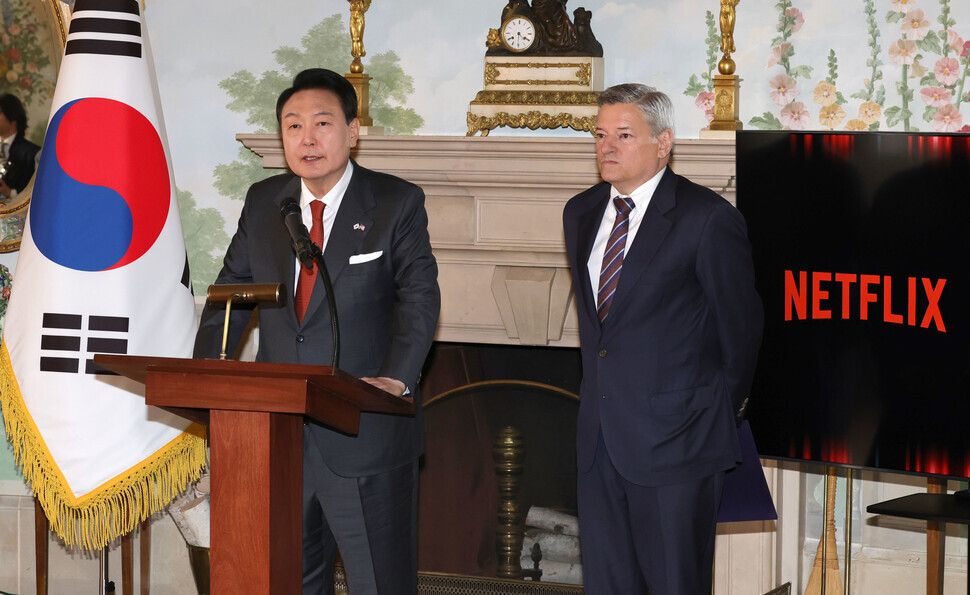hankyoreh
Links to other country sites 다른 나라 사이트 링크
Netflix imperialism: Are Korea’s days as the platform’s favorite content creator numbered?

Four years ago, Catherine Tait, president of the Canadian Broadcasting Corporation (CBC), openly criticized Netflix’s ambitious expansion as the “beginning of a new empire.”
While Netflix strives to paint its massive reach as contributing to diversity and aiding cultural development in local communities, Tait asserted that the media behemoth was ultimately aiming for economic and political hegemony, just like the imperialists of the 19th century.
The head of Canada’s public broadcaster warned that letting a single company from a single country play a sweeping role across the cultural industries of many countries would have major consequences and urged listeners to consider “what happens after imperialism and the damage that can do to local communities.”
More critical research is being published about Netflix’s realization of “platform capitalism” on a multinational scale.
Stuart Davis, an assistant professor of communication studies at Baruch College (part of the City University of New York) drew attention to the dangers that Netflix’s ambitions pose to media industries and consumers in various countries in a 2021 paper titled, “What Is Netflix Imperialism? Interrogating the Monopoly Aspirations of the ‘World’s Largest Television Network.’”
To earn bigger profits while heading off potential competitors, Netflix adopted a distinctive model of advertising-free programming. It established a global subscriber base in a short period of time. As is well known, it internalizes a system of producing and distributing high-budget content while holding a monopoly on its intellectual property rights.
Expanding its services to media markets in around 200 countries — starting with Canada in 2010 — Netflix has adopted a two-pronged strategy of localization and internationalization.
It has achieved localization through the purchasing of content licenses in different countries, the creation of production facilities there, and the hiring of local staff. At an international level, it has also made large investments in multinational production studios.
Its strategy involves providing consistent original programming and content at a level no competing business can match in the country in question. In other words, it is raising the entry barrier by overinvesting in content production compared with the rate at which its subscriber base has grown.
It’s a process that has also given rise to tactics such as hiring locally to avoid taxation and abusing wage differences while outsourcing to independent producers. In a recent study, Korea University professor Park Ji-hoon observed that Netflix’s structure is one that inevitably increases platform dependency due to the ability to earn short-term net gains through global distribution profits.
Davis’ study raised concerns about the employment of user data as raw materials for business growth.
Netflix has claimed that in contrast with other Big Tech companies, it only uses subscriber data internally to improve its recommendation algorithm. But the predictive assessment of production trends and viewer tastes based on these data can also result in recommendations where the algorithm reinforces implicit prejudices, racially based preconditions, and discriminatory patterns — not to mention potentially performing an ideological function.
It’s a situation that could create issues of cultural imperialism, where user engagement becomes a pretext for reinforcing particular cultural preconceptions and ideological perspectives. The ability to influence cultural tastes and shape collective consciousness in a country is a powerful, even frightening force.
A few days ago, I heard from a producer who had had major success with original Netflix content that while the South Korean content industry might seem to have a “fresh-looking stem,” the “roots are all rotten.” They voiced fears about the same kind of collapse that Hong Kong cinema experienced.
There’s no saying that after cherry-picking Korean content for four years, Netflix won’t move to a different region and expand its imperialism there. This is why countries urgently need institutional changes to protect their domestic content industries.

By Choi Sun-young, visiting professor at the Graduate School of Communication & Arts at Yonsei University
Please direct questions or comments to [english@hani.co.kr]

Editorial・opinion
![[Editorial] Korea must respond firmly to Japan’s attempt to usurp Line [Editorial] Korea must respond firmly to Japan’s attempt to usurp Line](https://flexible.img.hani.co.kr/flexible/normal/500/300/imgdb/original/2024/0514/2317156736305813.jpg) [Editorial] Korea must respond firmly to Japan’s attempt to usurp Line
[Editorial] Korea must respond firmly to Japan’s attempt to usurp Line![[Editorial] Transfers of prosecutors investigating Korea’s first lady send chilling message [Editorial] Transfers of prosecutors investigating Korea’s first lady send chilling message](https://flexible.img.hani.co.kr/flexible/normal/500/300/imgdb/original/2024/0514/7917156741888668.jpg) [Editorial] Transfers of prosecutors investigating Korea’s first lady send chilling message
[Editorial] Transfers of prosecutors investigating Korea’s first lady send chilling message- [Column] Will Seoul’s ties with Moscow really recover on their own?
- [Column] Samsung’s ‘lost decade’ and Lee Jae-yong’s mismatched chopsticks
- [Correspondent’s column] The real reason the US is worried about Chinese ‘overcapacity’
- [Editorial] Yoon’s gesture at communication only highlights his reluctance to change
- [Editorial] Perilous stakes of Trump’s rhetoric around US troop pullout from Korea
- [Guest essay] Preventing Korean Peninsula from becoming front line of new cold war
- [Column] The state is back — but is it in business?
- [Column] Life on our Trisolaris
Most viewed articles
- 1[Editorial] Transfers of prosecutors investigating Korea’s first lady send chilling message
- 2Major personnel shuffle reassigns prosecutors leading investigations into Korea’s first lady
- 3Korea cedes No. 1 spot in overall shipbuilding competitiveness to China
- 4US has always pulled troops from Korea unilaterally — is Yoon prepared for it to happen again?
- 5Second suspect nabbed for gruesome murder of Korean in Thailand, 1 remains at large
- 6[Editorial] Korea must respond firmly to Japan’s attempt to usurp Line
- 7Naver’s union calls for action from government over possible Japanese buyout of Line
- 8[Photo] Korean students protest US complicity in Israel’s war outside US Embassy
- 9[Correspondent’s column] The real reason the US is worried about Chinese ‘overcapacity’
- 10[Column] Samsung’s ‘lost decade’ and Lee Jae-yong’s mismatched chopsticks